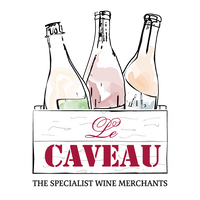Loups-Garoux speaks of the woodland and is mercurial in nature. Deirdre and Caleb use typical biodynamic preps of horn manure, silica, horsetail, stinging nettle, kaolin clay, and small amounts of minerals copper and sulphur due to intense humidity and also experiment with plant medicines provided by the vineyard floor when needed. Loups is 100% Frontenac Noir destemmed into small open fibreglass vats for wild ferment and then into 59 gallon seven year old Burgundian casks for ageing. No sulphur is used in the making of this wine. This wine is made essentially like a ripasso on the vine. Because of its naturally high acidity, they wait until about half of each bunch is raisined then pick the whole bunches, seeking the tension between the raisined fruit and the fresh. This Valpol-style approach yields aromas of blood sausage, bruised sour black plums and notes of bitter chocolate and roasted herbs. This would be great with venison or meat cooked with wild berry fruit.
LA GARAGISTA, DEIRDRE HEEKIN & CALEB BARBER, BARNARD, Vermont – Biodynamic
La Garagista Farm + Winery began in 2010. Deirdre and Caleb farm three parcels of co-planted, alpine varietals that are horticultural crosses of vinifera and native riparia and labrusca vines. The family trees of these varietals are quite baroque and uniquely American. They practice biodynamic and also pull from organic and permacullture concepts. Firstly, in the home farm and vineyard in the Chateauguay, a protected forest in Barnard, Vermont (1600 feet) where they also grow vegetables and fruit and raise some livestock for their restaurant Osteria Pane e Salute. The farm is a polyculture project with vegetables, orchards, flower gardens, vines, and chickens all interplanted. The chickens are particularly interplanted. They also raise pigs on farm, utilizing them to naturally till new ground. In the vineyard, they co-plant vegetables between the vines focusing on root vegetables, escaroles and chicories, and flowers, all things that aid the soils in this parcel. The two other parcels are in the Champlain Valley (184/194 feet) and are close to Lake Champlain. No-till and natural field cover crops are part of the farming at these two vineyards, encouraging the flora and fauna particular to each microclimate.
The wines are stunning – the whites (which are amber-hued) wildly floral with flavours of orange marmalade, cloves, wild mint and strawberry leaf. They are nourishing. La Crescent expresses the different terroirs of the vineyards in the most eloquent way imaginable. The reds are very different. All share this Alpine meadow character; Deirdre has captured something unique here.




